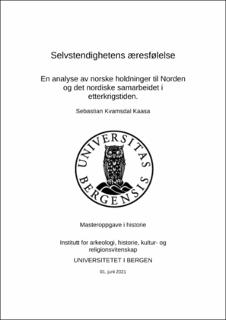| dc.description.abstract | In this thesis I aim to analyse the Norwegian opinions towards the Nordic community and co-operation in the post-war era and examine how and in what way these opinions changed during this period. With regards to the level of eagerness in Nordic co-operation, from the Nordic Council was established in 1952 as the first official institution for co-operation between the Nordic parliaments of Norway, Denmark, Finland, Iceland, and Sweden, Norway has often been considered the “sceptical” and “ambivalent” actor, especially in the early post-war era. The same characteristics have also been ascribed to Norway with regards to the two referendums on EC/EU-membership in 1972 and 1994. In broad terms, there are two different “dimensions” of opinion when discussing Norway’s relationship to Nordic co-operation: a political and a cultural dimension. The political dimension can be summarised as pure political convictions. Examples include economic and security positions, where the Nordic countries, have differed to a great extent relative to each other. The latter is more abstract but just as important, and includes the Nordic countries’ cultural and historical traditions, way of life, religion, and language. This thesis will utilize both the political and the cultural dimension of opinion to analyse the Norwegian opinion in four major events in direct connection to Nordic co-operation in the post war area up to 1972: the formation of the Nordic Council in 1952, where Norway was the only country with a sizeable opposition; the negotiations for a Nordic common market/customs union from 1947-1954; and the Helsinki Treaty. I will also analyse whether the Nordic co-operation had any effect on the three Norwegian discussions related to EFTA-, EEC, and EC-membership within the same period. I argue that the understanding of Norway as the sceptical actor in the face of willing neighbouring countries in Norden, is somewhat oversimplified and exaggerated. After years of positive results of co-operation in the Nordic region, changes in both historical and war-time perceptions, as well as the developments of an ever more consolidating European integration project, the “Nordic-opinion” in Norway changed drastically in the 60s and 70s. | |
